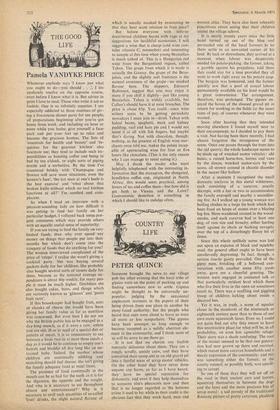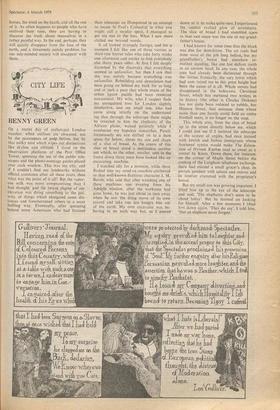PETER QUINCE
Someone brought the news to our village pub the other evening that the local tribe of gipsies were on the point of packing up and finding somewhere new to settle. Gipsies might be thought to be universally un- popular, judging by the occasional unpleasant accounts in the papers of their being driven from one place to another by stony-faced authority; but the people who heard that ours were about. to leave us were all more or less sympathetic. The gipsies have been amongst us long enough to become accepted as a mildly aberrant ele- ment in the community, and I think most of us will be sorry to see them go.
• It is not that we cherish any foolish romantic delusions about them. They are a rough, scruffy, untidy crew, and they have converted their camp-site in an old gravel pit into a fearful mess of scrap motor vehicles. On the other hand they have never done anyone any harm, so far as I have heard; they have no special reputation for dishonesty, and even if they help themselves to someone else's pheasants now and then that is no longer regarded as the heinous crime it used to be; while to their credit is the obvious fact that they work hard, men and women alike. They have also been tolerably punctilious about seeing that their children attend the village school.
It is nearly twenty years since the little band turned up out of the blue and persuaded one of the local farmers to let them settle in an unwanted corner of his land. By luck or shrewdness, they arrived at a moment when labour was desperately needed for potato-picking; the farmer, taking a gamble against his prejudices, told them they could stay for a time provided they all went to work right away on his potato crop. The bargain was honoured, and the farmer quickly saw that a pool of casual labour permanently available on his land would be a great convenience. The arrangement, therefore, was prolonged. The gipsies en- joyed the haven of the disused gravel pit in return for working in the fields (at the usual rates of pay, of course) whenever they were wanted.
Soon after hearing that they intended moving elsewhere I found myself near to their encampment, so I decided to pay them a visit. Not having been there recently, I had almost forgotten the strangeness of the scene. Once one passes through the trees into the old quarry, the whole landscape seems to be made up of wrecked motor vehicles: old buses, a ruined horse-box, lorries and vans by the dozen, wrecked motor-cars by the score, all strewn around in chaotic disorder in the saucer-like hollow.
After a moment I recognised the small domestic enclaves in this metal wilderness, each consisting of a caravan, usually decrepit, with a hut or two to accommodate the family overspill and nearby a smoulder- ing fire. As I walked up a young woman was boiling clothes in a large tin bath which had been fixed on heaps of stones over a blazing log fire. Hens wandered around in the wood- smoke, and each caravan had at least one dog, of rare size and ferocity, either hurling itself against its chain or barking savagely over the top of a disturbingly flimsy bit of fence.
Since this whole unlikely scene was laid out upon an expanse of black and squelchy mud, the general effect ought to have been unrelievedly depressing. - In fact, though, a certain louche gaiety prevailed. One of the gipsy men, breaking off a bellowed con- versation with another some fifty yards away, gave me a cheerful greeting. The women were engaged in animated talk at that particularly strident level which those who live their lives in the open air sometimes resort to. There was a scuffling and giggling troop of children larking about inside a decayed bus.
Yet it was, in truth, a scene of squalor closer to the standards of the nineteenth or eighteenth century poor than to those of our own more squeamish times. Even so, I could not quite find out why they meant to leave this unattractive place for what will be, in all probability, an even less agreeable refuge. Their story was a shade confusing. The root of the matter seemed to be that one genera- tion had now grown up there and married, which meant more caravan households and a steady expansion of the community; and this was something either the farmer, or the county council, or possibly both, was unwill- ing to accept.
So one of these days they will set off on the road in their ancient cars and lorries, squeezing themselves in between the dogs and the hens and the more precious bits of scrap metal : a sad parody of the traditional Romany picture of pretty caravans, plodding horses, the wind on the heath, and all the rest of it. As often happens to people who have outlived their time, they are having to discover the truth about themselves in a rather painful way. In the end, perhaps, they will quietly disappear from the face of the earth, and a tiresomely untidy problem for our tidy-minded society will disappear with them.



































 Previous page
Previous page